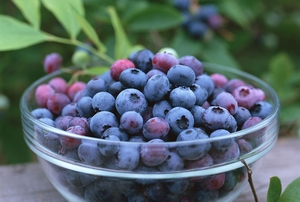A study pu blished in PLOS ONE shows that blueberries deliver greater polyphenol absorption and fat burning benefits during and after exercise. Blueberries have high concentrations of polyphenols, a class of bioactive compounds in fruits and vegetables that help to lower blood pressure and blood glucose, reduce inflammation, and fight off the damaging effects of free radicals. This study shows that exercise may enhance the absorption of these polyphenols.
blished in PLOS ONE shows that blueberries deliver greater polyphenol absorption and fat burning benefits during and after exercise. Blueberries have high concentrations of polyphenols, a class of bioactive compounds in fruits and vegetables that help to lower blood pressure and blood glucose, reduce inflammation, and fight off the damaging effects of free radicals. This study shows that exercise may enhance the absorption of these polyphenols.
Thirty-eight long-distance runners, ages 19–45, were given either a soy protein complex infused with polyphenols from blueberries and green tea, or just the protein complex. The runners ingested the complex for two weeks, and during three days of running for 2.5 hrs each day.
“Following prolonged running, athletes experience transient inflammation, oxidative stress, and immune dysfunction,” said David Nieman, Director of the Appalachian State University Human Performance Lab and lead author on the study.
“Metabolomics, a new technology, showed that the intense exercise increased gut permeability, promoting the transfer of phenolics into the body in much higher amounts then before the exercise.”
In addition, the researchers found that the runners in the treatment group demonstrated a longer spike in their metabolism after exercise, known as metabolic afterburn. They found fatty acid oxidation and ketogenesis with more ketones at 14 hrs post-exercise in the treatment group. The placebo group went back to normal levels. Ketogenesis is the production of biochemicals called ketones that result from the breakdown of fatty acids in the liver, which in turn provides energy to the body, especially the heart and brain.
“The findings reinforce the potential benefits of consuming fruits and vegetables, and in particular blueberries, before and after exercise,” said Mary Ann Lila, Director of North Carolina State University’s Plants for Human Health Institute.
 blished in PLOS ONE shows that blueberries deliver greater polyphenol absorption and fat burning benefits during and after exercise. Blueberries have high concentrations of polyphenols, a class of bioactive compounds in fruits and vegetables that help to lower blood pressure and blood glucose, reduce inflammation, and fight off the damaging effects of free radicals. This study shows that exercise may enhance the absorption of these polyphenols.
blished in PLOS ONE shows that blueberries deliver greater polyphenol absorption and fat burning benefits during and after exercise. Blueberries have high concentrations of polyphenols, a class of bioactive compounds in fruits and vegetables that help to lower blood pressure and blood glucose, reduce inflammation, and fight off the damaging effects of free radicals. This study shows that exercise may enhance the absorption of these polyphenols.Thirty-eight long-distance runners, ages 19–45, were given either a soy protein complex infused with polyphenols from blueberries and green tea, or just the protein complex. The runners ingested the complex for two weeks, and during three days of running for 2.5 hrs each day.
“Following prolonged running, athletes experience transient inflammation, oxidative stress, and immune dysfunction,” said David Nieman, Director of the Appalachian State University Human Performance Lab and lead author on the study.
“Metabolomics, a new technology, showed that the intense exercise increased gut permeability, promoting the transfer of phenolics into the body in much higher amounts then before the exercise.”
In addition, the researchers found that the runners in the treatment group demonstrated a longer spike in their metabolism after exercise, known as metabolic afterburn. They found fatty acid oxidation and ketogenesis with more ketones at 14 hrs post-exercise in the treatment group. The placebo group went back to normal levels. Ketogenesis is the production of biochemicals called ketones that result from the breakdown of fatty acids in the liver, which in turn provides energy to the body, especially the heart and brain.
“The findings reinforce the potential benefits of consuming fruits and vegetables, and in particular blueberries, before and after exercise,” said Mary Ann Lila, Director of North Carolina State University’s Plants for Human Health Institute.





